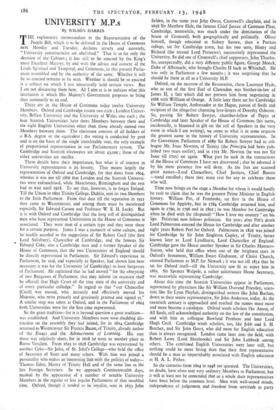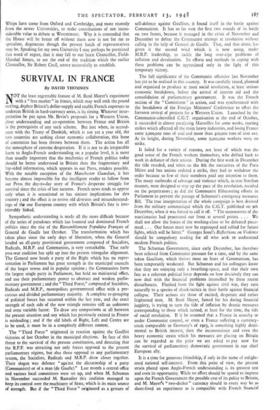UNIVERSITY M.P.s
By WILSON HARRIS
THE explanatory memorandum to the Representation of the People Bill, which is to be debated in the House of Commons next Monday and Tuesday, declares tersely and austerely, "University constituencies are abolished." That is so far only the decision of the Cabinet ; it has still to be enacted by the King's most Excellent Majesty, by and with the advice and consent of the Lords Sp:ritual and Temporal, and Commons, in this present Parlia- ment assembled and by the authority of the same. Whether it will be so enacted remains to be seen. Whether it should be so enacted is a subject on which I not unnaturally hold certain views. But I am not discussing them here. All I aim at is to indicate what this institution is which His Majesty's Government proposes to bring thus summarily to an end.
There are in the House of Commons today twelve University Members. Oxford and Cambridge return two each ; London Univer- sity, Belfast University and the University of Wales one each ; the four Scottish Universities have three Members between them and the eight English Universities other than those already named two Members between them. The electorate consists of all holders of a B.A. degree or the equivalent ; the voting is conducted by post and is on the basis of the single transferable vote, the only example of proportional representation in our Parliamentary system. The Cambridge and Scottish electorates are about 43,000 ; those of the other universities are smaller.
These details have their importance, but what is of interest in University representation is its history. That means largely the representation of Oxford and Cambridge, for that dates from 1604, whereas it was not till 1868 that London and the Scottish Universi- ties were enfranchised, while Manchester, Birmingham and the rest had to wait until 1918. To say that, however, is to forget Ireland. Till the Union in 18oi Trinity College, Dublin, sent its two Members to the Irish Parliament. From that date till the separation in 1921 they came to Westminster, and among them must be mentioned especially Sir Edward Carson and Professor W. E. H. Lecky. But it is with Oxford and Cambridge that the long roll of distinguished men who have represented Universities in the House of Commons is associated. They were men of a certain type and they were there for a certain purpose. James I was a monarch of some culture, and he readily acceded to the suggestions of Sir Robert Cecil (the first Lord Salisbury), Chancellor of Cambridge, and the famous Sir Edward Coke, also a Cambridge man and a former Speaker of the House of Commons, that the two Universities of England should be directly represented in Parliament. Sir Edward's experience in Parliament, he said, and especially as Speaker, had shown him how necessary it was for the University (of Cambridge) to have burgesses - of Parliament. He explained that he had moved "for the obteyning of two Burgesses of Parliament, that may inform (as occasion shall be offered) that High Court of the true state of the university and of every particular colledge." In regard to that "our Chancellor [Cecil] was moved, who instantly and effectively moved his Majestic, who most princely and graciously granted and signed yt." A similar step was taken at Oxford, and in the Parliament of 1604 both Universities were for the first time represented.
So the great tradition—for it is beyond question a great tradition— was established. And University Members were soon shedding dis- tinction on the assembly they had joined, for in 1614 Cambridge returned to Westminster Sir Francis Bacon, of Trinity, already author of the Essays and the Advancement of Learning. His stay there was relatively short, for in 1618 he went to another place as Baron Verulam. From 1625 to 1628 Cambridge was represented by another Coke—Sir John, of St. John's College—who held the office of Secretary of State and many others. With him was joined a personality who makes an interesting link with the politics of today— Thomas Eden, Master of Trinity Hall and of the same line as the late Foreign Secretary. So we approach Commonwealth days, marked by the appearance of a number of notable University Members in the regular or less regular Parliaments of that troubled time. Oxford, though it tended to be royalist, sent in 1653 John Selden, in the same year John Owen, Cromwell's. chaplain, and in 1658 Sir Matthew Hale, the famous Chief Justice of Common Pleas. Cambridge, meanwhile, was much under the domination of the house of Cromwell, both geographically and politically. Oliver himself, though educated at Sidney Sussex, then a Puritan college, sat for Cambridge town, but his two sons, Henry and Richard (the second Lord Protector), successively represented the University. So did one of Cromwell's chief supporters, John Thurloe. So,.unexpectedly, did a very different public figure, George Monck, Duke of Albemarle, who brought Charles II back to Whitehall. He was only in Parliament a few months ; it was surprising that he should be there at all as a University M.P.
Oxford, on the morrow of the Restoration, chose Laurence Hyde, who as son of the first Earl of Clarendon was brother-in-law of James II, a fact which did not prevent him from negotiating in 1688 with Willliam of Orange. A little later there sat for Cambridge Sir William Temple, Ambassador at the Hague, patron of Swift and recipient of the altogether charming love-letters of Dorothy Osborne. So, passing Sir Robert Sawyer, chamber-fellow of Pepys at Cambridge and later Speaker of the House of Commons (his name, incidentally, is blazoned in gilt on the roll of Speakers in the very room in which I am writing), we come to what is in some respects the greatest name in the history of University representation. In the Convention Parliament of 1689 Sir Robert Sawyer had as col- league Mr. Isaac Newton, of Trinity (the Principia had been pub- lished two years earlier), and in 1701 Mr. Newton (he was not Sir Isaac till 1705) sat again. What part he took in the transactions of the House of Coimmons I have not discovered ; that he adorned it by his mere presence few will deny. As the lists are scanned great names—Lord Chancellors, Chief Justices, Chief Barons —stand enrolled ; there they must rest for any to celebrate them who will.
Time now brings on the stage a Member for whom it would hardly be rash to claim that he was the greatest Prime Minister in English history. William Pitt, of Pembroke, sat first in the House of Commons for Appleby, but in 1784 Cambridge returned him, and again in 1790, in 1796 and in 1802; he was Member for Cambridge when he died with the (disputed) "How I love my country" on his lips. Politician now follows politician. Six years after Pitt's death Lord Palmerston entered the House for Cambridge and after another eight years Robert Peel for Oxford. Palmerston in 1826 was joined for Cambridge by Sir John Singleton Copley, of Trinity, better known later as Lord Lyndhurst, Lard Chancellor of England. Cambridge gave the House another Speaker in Sir Charles Manners- Sutton, who held that office when one of the brightest stars in Oxford's firmament, William Ewart Gladstone, of Christ Church, entered Parliament as M.P. for Newark ; it was not till 1852 that he sat for Oxford itself—till the University saw fit to reject him in 1865. Sir Spencer Walpole, a rather unfortunate Home Secretary, was meanwhile representing Cambridge.
About this time the Scottish Universities appear in Parliament, represented by physicians like Sir William Overend Priestley, scien- tists like Sir Lyon Playfair, distinguished writers like John Buchan, down to their senior representative, Sir John Anderson, today. As the twentieth century is approached and reached the names must more and more become a catalogue. Oxford sends scholars like Anson, of All Souls, still acknowledged authority on the law of the constitution, and with him as colleague Rowland Prothero and later Lord Hugh Cecil. Cambridge sends scholars, too, like Jebb and S. H. Butcher, and Sir John Gorst, who did more for English education than is always recognised. London came later into the field, with Robert Lowe_ (Lord Sherbrooke) and Sir John Lubbock among others. The combined English Universities were later still, but nothing could be more fitting than that their first representative should be a man as imperishably associated with English education as H. A.. L. Fisher.
So the centuries from 1604 to 1948 are spanned. The Universities, no doubt, have often sent very ordinary Members to Parliament, but it will at least not be contended that as a whole their representatives have been below the common level. Men with well-stored minds, independence of judgement and freedom from servitude to party Whips have come from Oxford and Cambridge, and more recently from the newer Universities, to make contributions of not incon- siderable value to debate at Westminster. Why it is contended that the House will be better off without them now is not for me to speculate, degenerate though the present batch of representatives may be. Speaking for my own University I may perhaps be permitted this word of regret, that it may fall to our latest Chancellor, Field- Marshal Smuts, to see the end of the tradition which the earlier Chancellor, Sir Robert Cecil, strove successfully to establish.



































 Previous page
Previous page